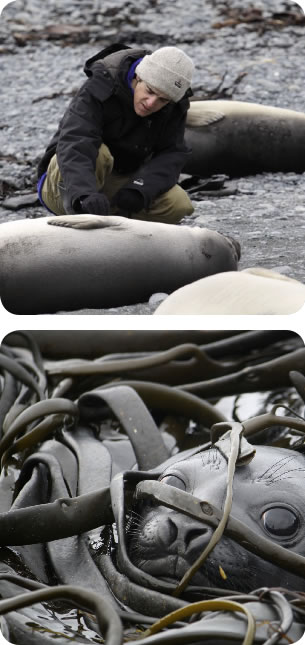
Ben Arthur
Institute of Marine and Antarctic Studies
The secret life of seals
Seals are a bit like dolphins, it's almost impossible not to like them. And fair enough too, they're big, charismatic and cute (well, most of the time anyway). But unfortunately for us, we usually only get to see them when they come to land, or close to it.
Nature and animals have always fascinated me. As a kid I used to spend most of my weekends outside, just looking for cool stuff to do. So after finishing college I didn't hesitate in enrolling in a Bachelor of Science at UTAS. Of course, I chose Zoology as my major and then went on to do Honours in Zoology, for which I studied the ecologies of two species of beach-nesting shorebirds.
After graduating in 2009, I began working as a research assistant at the Antarctic Wildlife Research Unit at UTAS. The work involved the use of satellite tags to track the movements of Southern Elephant Seals while they're at sea. During the summer of 2009/10, I was lucky enough to spend 6 months on Macquarie Island in the middle of the Southern Ocean researching Elephant Seals.
Whilst on the island, our small research crew had two main jobs. The first was to head down to the beaches every morning and look for seals that had been caught in the past and identified with a unique brand or flipper tag. Finding these known animals could tell us all sorts of cool information about them, such as how long they live. Our second job was to help catch female seals, which we weighed, measured, and then deployed satellite trackers on before they went to sea to feed for the winter. The tags constantly beam information to satellites, letting us spy on our seals to find out exactly where in the Southern Ocean they are, and what they've been up to!
As a Zoologist I've been given great opportunities to visit some of the most amazing places, and work up close and personal with some of the world's coolest animals. It's also very rewarding knowing that the work I've been involved with over the last couple of years has a conservation application, and will hopefully be used to manage and protect not only the seals, but also the entire Southern Ocean ecosystem.
Find out more about Southern Elephant Seals and other work done by the UTAS Antarctic wildlife Research Unit: https://www.zoo.utas.edu.au/awru/AWRU1020.htm
